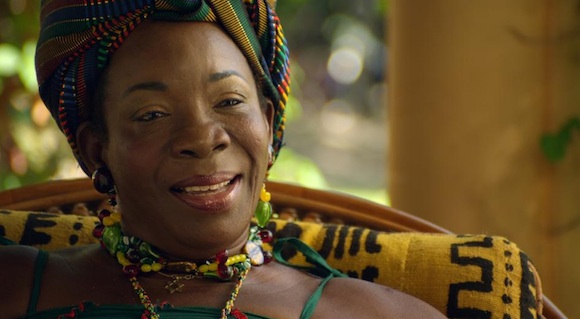{2jtab: Movie Review}

|
![]()
The legacy of Bob Marley – who died at 36 – sometimes gets a bit corroded with talk of prophet and holy figure. Numerous documentaries have presented the iconic reggae figure as a saint worthy only of worship. Few have considered Marley as a man obsessed with music, love, and understanding…which makes Kevin MacDonald’s Marley a must. Focused, straight-played, and completely about the man – warts and all – Marley is the head cornerstone of legitimacy concerning Bob Marley and the music he made with Peter Tosh, Bunny Wailer, and the rest of The Wailers.
Embracing the poverty of Marley’s upbringing, director MacDonald (The Eagle) mixes archival footage with some new shots of a rarely seen rural Jamaica and delves deep into Marley’s biracial background, the outcast fitting that eventually came to give him purpose, and his love of music. Interviews range from his widow Rita, Bunny Wailer, Judy Mowatt, Chris Blackwell, Cindy Breakspeare, eldest children Ziggy and Cedella, and Lee “Scratch” Perry, the famed producer who probably taught Marley more about music than any other person on the planet.
MacDonald digs into Marley’s Nine Mile residence, his paternal denial of Norval Sinclair Marley, his Wilmington, Delaware existence, his sojourn to England, the rise and fall of The Wailers, his deep political and spiritual beliefs, and the malignant melanoma diagnosis in 1977 that would take his life in 1981.
MacDonald is the third director to be attached to the Marley project. First, it was Martin Scorsese and then Johnathan Demme was set to make it happen. The Marley family embraced the movie. Now, with so many of Marley’s contemporaries still alive, was the time to set the story straight. Dispel the rumors. Talk hard. Speak the truth about the man whose face continues to sell a t-shirt every five seconds. Unfortunately, the film couldn’t keep a director.
MacDonald is no stranger to the documentary format and manages to keep things steady, informative, and reserved without the hero worshipping that sometimes befalls these iconic biographies. His deft hand navigates through the Rastafarian religion quite well and provides insight into the many, many, many women and children Marley managed (11 kids in 7 different relationships). There’s no narrator. MacDonald lets the interviewees and images do that; sometimes the music takes over and guides us to the next year encompassed by the documentary.
Only one thing is missing: Marley himself. There’s a collection of interviews MacDonald has waded through. There are some great quotes and a few great live performances, but we’ve seen a lot of this footage before. Why? Because there’s almost a complete absence of footage and photography from the formative (and best) years of Bob Marley and the Wailers. Very little people cared about the band (outside of Jamaica, that is) until 1975.
Now, the music; his music, is everywhere. For a long time, though, it was not so. As Marley points out, The Wailers tried and failed for a long time to make a dent in America and American radio stations. It seems reggae music, with its emphasis on the upstroke, confused the public. Leave it to a cover by Eric Clapton, opening for Bruce Springsteen and the E Street Band, and a jealous Sly Stone to make England aware of a powerful force that Africa was already heralding.
Marley, himself, did very little interviews. He was shy and reluctant to talk to journalists. He had no formal education. He hid his feelings about his absent white father and there was little sense in trying to defy his outsider image. MacDonald works with what we do have and offers a film that looks into a life that was gone all too soon.
There's nothing really new or shocking included in the biopic, but - due to its honesty and compassion - Marley is not to missed.
{2jtab: Film Details}
 MPAA Rating: PG-13 for drug content, thematic elements and some violent images.
MPAA Rating: PG-13 for drug content, thematic elements and some violent images.
Director: Kevin Macdonald
Writer:
Cast: Bob Marley, Ziggy Marley and Jimmy Cliff
Genre: Documentary
Tagline: Marley
Memorable Movie Quote: "I became his guardian angel"
Distributor: Magnolia Pictures
Official Site: www.magpictures.com/marley
Release Date: April 20, 2012 (limited)
DVD/Blu-ray Release Date: No details available
Synopsis: Bob Marley's universal appeal, impact on music history and role as a social and political prophet is both unique and unparalleled. Marley is the definitive life story of the musician, revolutionary, and legend, from his early days to his rise to international superstardom. Made with the support of the Marley family, the film features rare footage, incredible performances and revelatory interviews with the people that knew him best.
From Academy Award-winning director Kevin Macdonald comes the story of a towering figure of musical history, whose music and message has transcended different cultures, languages and creeds to resonate around the world today as powerfully as when he was alive.
{2jtab: Blu-ray Review}
No details available
{2jtab: Trailer}
{/2jtabs}



























